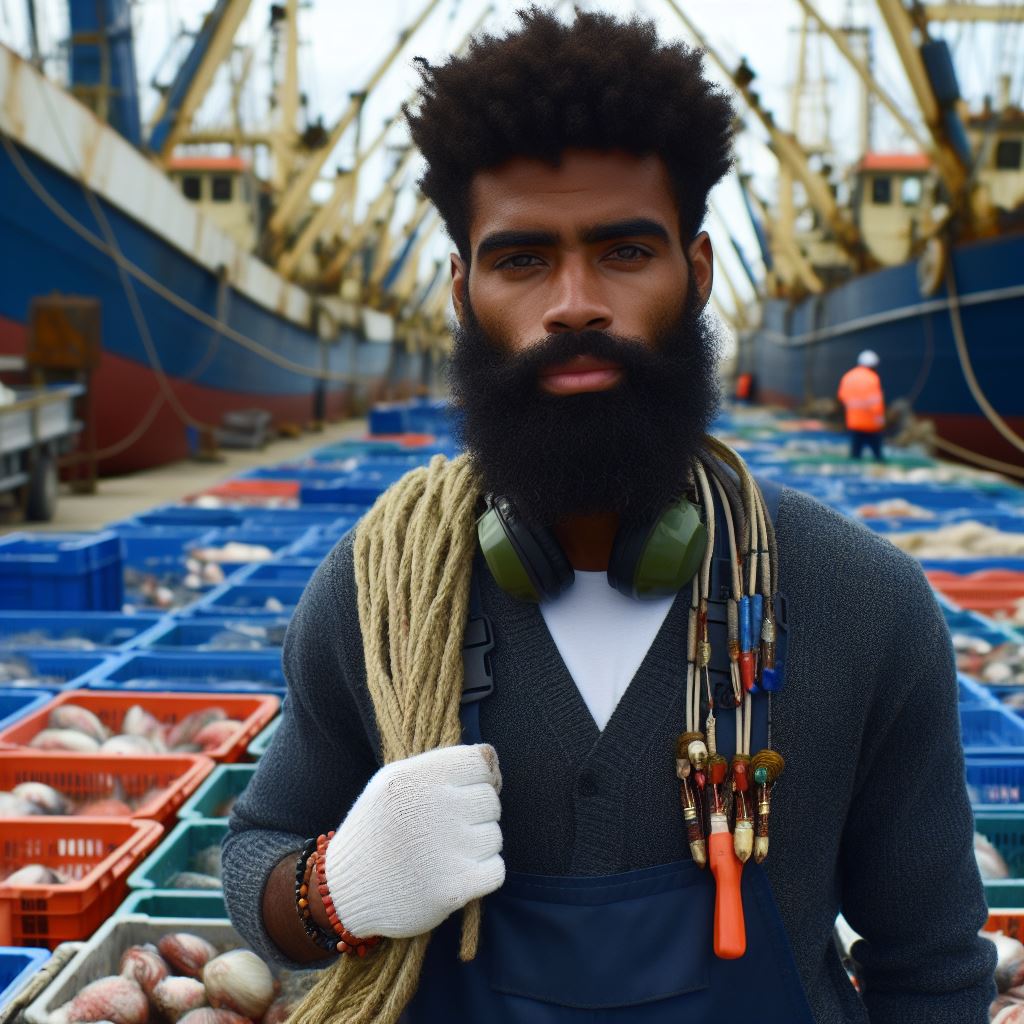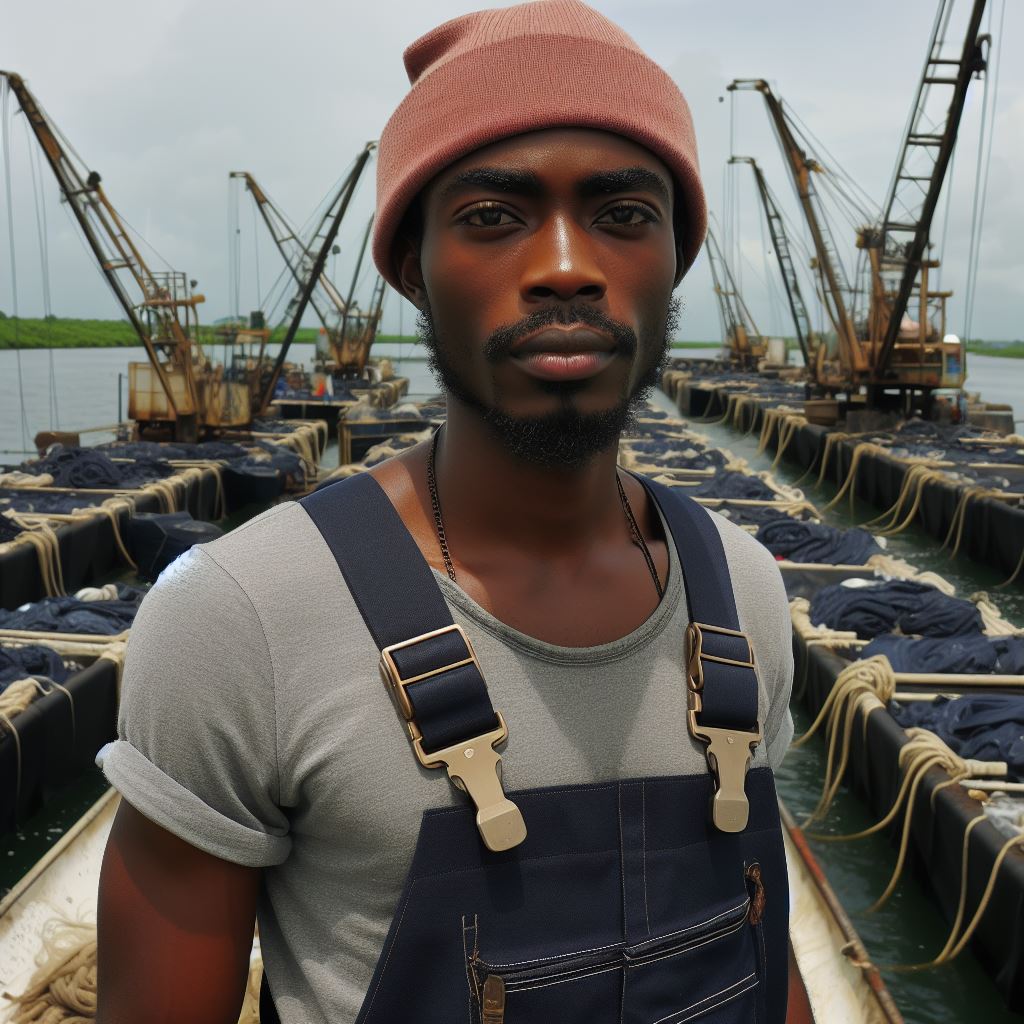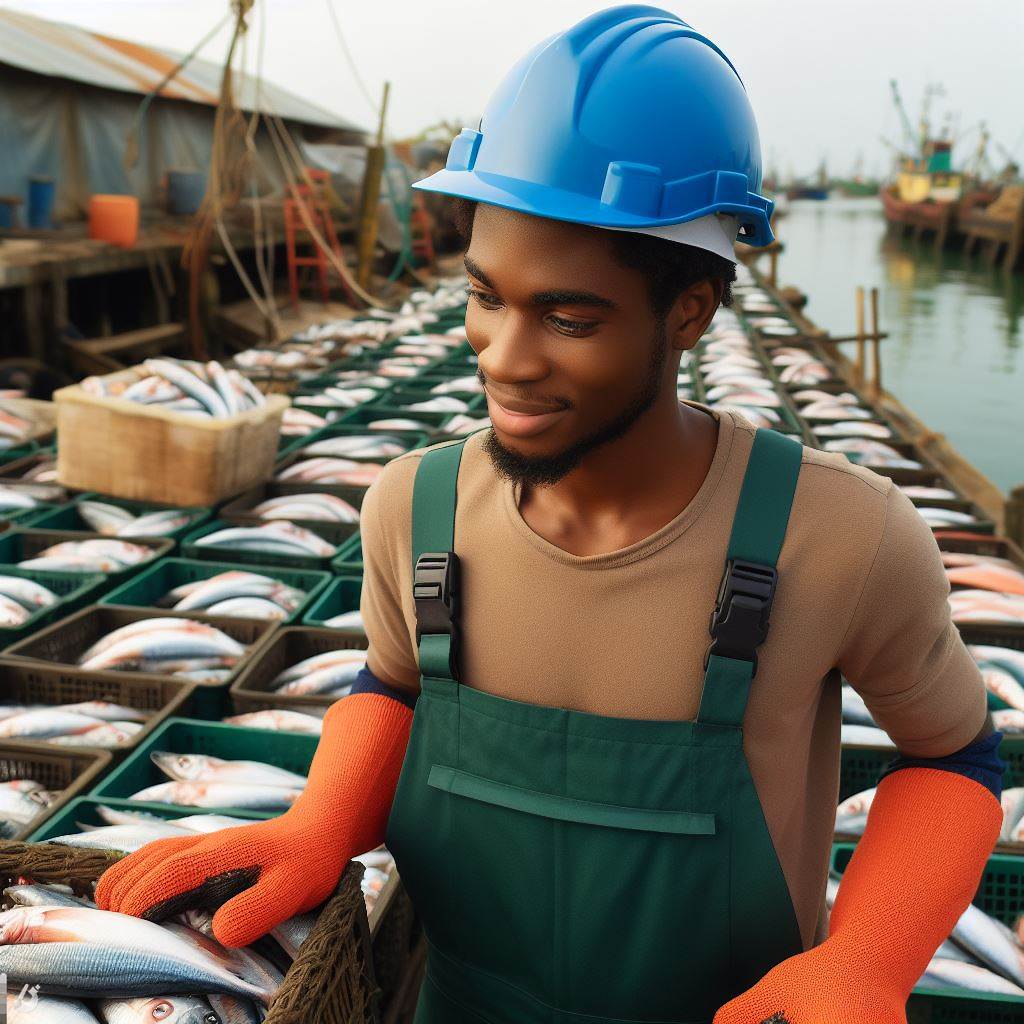Introduction
Student Life in a Nigerian Fisheries Faculty: Nestled within the vibrant educational landscape of Nigeria is the Fisheries Faculty, a unique institution that stands as a testament to the country’s commitment to sustainable resource management.
Boasting a rich curriculum, the faculty equips students with the skills needed to navigate the complex world of fisheries and aquaculture.
From marine biology to sustainable fishing practices, this academic haven provides a comprehensive understanding of Nigeria’s aquatic ecosystems.
In the heart of the bustling campus, where the aroma of adventure mingles with the salty breeze, students embark on a journey of discovery.
This blog post delves into the vibrant tapestry of life within the Nigerian Fisheries Faculty, capturing the essence of student experiences, challenges, and triumphs.
From dawn till dusk, amidst classrooms and aquatic laboratories, this is a firsthand account of the academic and personal odyssey undertaken by those passionate about sustaining Nigeria’s aquatic treasures.
In the subsequent section of this blog series, we will unravel the tales of late-night research escapades, the thrill of practical experiments, and the indomitable spirit that defines the students of the Nigerian Fisheries Faculty.
Join us as we dive deeper into the ocean of student experiences, exploring the intricate dance between academia and the profound connection to Nigeria’s aquatic legacy.
Overview of Nigerian Fisheries Faculty
History and establishment
- The Nigerian Fisheries Faculty was established in [year] to train students in fisheries-related fields.
- It has a rich history that dates back to the early years of Nigeria’s independence.
- Over the years, the faculty has produced highly skilled professionals in the fisheries industry.
Programs and courses offered
- The Nigerian Fisheries Faculty offers a wide range of programs and courses for students.
- Students can specialize in areas such as aquaculture, fisheries management, and fish processing.
- They are exposed to both theoretical knowledge and practical skills through hands-on training.
Importance in Nigeria’s economy and seafood industry
- The Nigerian Fisheries Faculty plays a vital role in Nigeria’s economy and seafood industry.
- It produces graduates who contribute to the development and growth of the fisheries sector.
- These graduates work in various capacities, such as fish farmers, fisheries managers, and seafood processors.
- Nigeria’s seafood industry relies on the expertise and knowledge imparted by the faculty to thrive.
- The faculty also conducts research to address challenges and improve the sustainability of the industry.
Overall, the Nigerian Fisheries Faculty has a remarkable history and continues to provide quality education in fisheries.
Its programs and courses equip students with the necessary skills to contribute to Nigeria’s economy and seafood industry.
Read: Research Innovations from Nigerian Fisheries Departments
Admission Process and Entry Requirements
Eligibility criteria for prospective students
- Minimum required grades in relevant subjects are necessary for admission.
- Prospective students must have completed their secondary education.
- A satisfactory performance in the university entrance examination is crucial.
- Applicants should have a strong interest in the field of fisheries and related sciences.
- Meeting the age requirement set by the university is also important.
Application process
- Applicants need to obtain the official application form from the university’s admission office.
- Submission of the completed application form along with all the required documents is mandatory.
- Documents include academic transcripts, recommendation letters, and a personal statement.
- A non-refundable application fee must be paid within the specified deadline.
- Once the application is submitted, applicants are given a unique identification number for future reference.
Competitive nature of the admission process
- The number of applicants far exceeds the available slots, making the admission process highly competitive.
- Only a limited number of students are accepted into the fisheries faculty each year.
- Academic performance, entrance examination scores, and extracurricular activities play a significant role in the selection process.
- Admission decisions are made based on a comprehensive evaluation of all the applicants’ qualifications.
- Only the most outstanding candidates are granted admission to the fisheries faculty.
Challenges faced by applicants
- Obtaining the required grades and meeting the entrance examination criteria can be demanding.
- Competition from highly qualified applicants from different regions poses a significant challenge.
- Understanding the application process and fulfilling all the requirements can be confusing for some applicants.
- Financial constraints may prevent some prospective students from pursuing their dream of studying in the fisheries faculty.
- The stress and pressure of the admission process can take a toll on the mental well-being of applicants.
Financial constraints also present a barrier to some students who wish to pursue their studies in the fisheries faculty.
The stress and pressure of the admission process can take a toll on the mental well-being of applicants.
Despite these challenges, those who are determined and passionate about the field are more likely to succeed in securing admission.
In essence, the admission process and entry requirements for the Nigerian Fisheries Faculty are rigorous.
Prospective students must meet strict eligibility criteria, navigate a competitive application process, and face various challenges along the way.
For those who are truly passionate about fisheries and are committed to their goals, the journey towards admission can be a rewarding one.
Read: Scholarships and Funding for Fisheries Students in Nigeria
Academic Structure and Learning Environment
In the Fisheries Faculty, the academic structure and learning environment are carefully designed to nurture students’ passion for fisheries and provide them with comprehensive knowledge and skills.
Faculty composition and expertise
The faculty composition comprises experienced professors with expertise in various areas of fisheries management and aquatic sciences.
Their guidance and insights contribute significantly to students’ learning journey.
Class size and student-to-faculty ratio
The class size in the faculty is kept moderate, ensuring effective student-teacher interaction.
With a favorable student-to-faculty ratio, professors can provide personalized attention and support to students.
This conducive environment fosters strong relationships between students and faculty members, creating a supportive learning atmosphere.
Teaching methods and curriculum
The teaching methods in the Fisheries Faculty are diverse and engaging. Professors utilize a combination of lectures, tutorials, lab work, and field trips to enhance students’ learning experience.
The curriculum is well-structured, covering various aspects of fisheries including biology, conservation, and sustainable management.
This comprehensive approach equips students with both theoretical knowledge and practical skills required in the industry.
Research opportunities and practical experiences for students
Research opportunities are abundant in the Fisheries Faculty. Students have access to state-of-the-art laboratories and research facilities, allowing them to conduct experiments and studies.
Faculty members actively involve students in ongoing research projects, providing them with valuable hands-on experience.
These research opportunities and practical experiences contribute to students’ academic growth and skill development.
Fieldwork is an integral part of the curriculum, exposing students to real-world scenarios and challenges. This practical approach enables students to apply their knowledge and develop critical thinking skills.
The Fisheries Faculty places great importance on providing students with practical experiences that prepare them for future careers in fisheries.
Overall, the academic structure and learning environment in the Fisheries Faculty play a vital role in shaping students’ experiences.
The experienced faculty, moderate class size, diverse teaching methods, and research opportunities contribute to a holistic learning journey.
The curriculum, combined with practical experiences, equips students with the necessary skills and knowledge to excel in the field of fisheries.
Read: Evolution of Fisheries Studies in Nigeria: A History

Student Life in a Nigerian Fisheries Faculty
Embarking on a journey through the vibrant and enriching life of a fisheries student in Nigeria unveils a tapestry woven with campus facilities, extracurricular pursuits, unwavering support services, and unique opportunities for networking.
Let’s dive into the immersive world of student experiences in a Nigerian Fisheries Faculty.
Campus Facilities and Amenities
Navigating the hallowed halls of our Fisheries Faculty feels like traversing a marine ecosystem itself.
State-of-the-art laboratories equipped with cutting-edge technology provide an experiential education.
Transform Your Career with Expert Guidance
Get personalized mentorship consulting that’s tailored to your unique path. Our expert advice is actionable and exclusive.
Get StartedThe aquaculture facilities mirror the industry’s best practices, offering a hands-on approach to learning.
Our library, a treasure trove of piscatorial knowledge, becomes a sanctuary for late-night study sessions.
Extracurricular Activities and Student Organizations
Life here is a dynamic symphony of academia and recreation.
Student organizations like the Fisheries Enthusiasts Club organize fishing excursions, fostering camaraderie among budding ichthyologists.
Annual events like the Fish Fest celebrate our cultural connection to fisheries, showcasing traditional fishing techniques and culinary delights.
These activities transcend the classroom, adding a splash of excitement to our academic journey.
Student Support Services and Counseling:
Amidst the rigorous coursework, a robust support system ensures no student feels adrift.
Counseling services provide a safe harbor for those navigating the challenges of academia, while mentorship programs pair students with seasoned professionals.
The faculty’s commitment to holistic development extends beyond grades, fostering an environment where personal growth is as valued as academic achievement.
Opportunities for Networking and Industry Exposure
In the world of fisheries, networking is the key to unlocking doors of opportunity.
Our faculty’s strategic partnerships with industry leaders pave the way for internships, workshops, and guest lectures.
Annual industry symposiums bring together students and professionals, creating a nexus where theoretical knowledge meets real-world application.
Basically, life in a Nigerian Fisheries Faculty is an immersive experience, blending academic rigor with a vibrant tapestry of extracurricular activities, robust support systems, and unparalleled industry exposure.
As we navigate the depths of piscatorial knowledge, we emerge not only as skilled professionals but also as well-rounded individuals ready to make a splash in the dynamic world of fisheries.
Read: Local vs. International: Fisheries Education Comparison
Difficulties and Challenges Faced by Students
Life in a Nigerian Fisheries Faculty is a unique journey that blends the rich tapestry of academia with the challenges inherent in the field of fisheries.
As students navigate the rigorous curriculum, they encounter several difficulties that shape their educational experience.
Intensive coursework and workload
The Fisheries program demands an intense commitment from students. The coursework is not for the faint-hearted, delving into marine biology, aquaculture, and environmental sciences.
As students strive to grasp the intricacies of sustainable fisheries management, the workload can be overwhelming.
Late-night study sessions and caffeine-fueled endeavors become the norm as they navigate through a sea of complex subjects.
Lack of adequate infrastructure and resources
Despite the importance of fisheries in Nigeria, many students find themselves grappling with a lack of adequate infrastructure and resources.
Outdated laboratories and insufficient research equipment hamper the practical aspect of their education.
Access to modern technology and research tools is limited, hindering their ability to explore the latest advancements in the field.
Limited internship and job placement opportunities
Securing hands-on experience in fisheries is a crucial aspect of the learning process, yet students face a scarcity of internship and job placement opportunities.
The disconnect between academia and industry poses a challenge as students yearn for real-world applications of their theoretical knowledge.
Navigating the transition from classroom to professional settings becomes a daunting task.
Financial constraints and funding issues
The dream of becoming fisheries experts is often marred by financial constraints.
Tuition fees, the cost of materials, and fieldwork expenses create a burden for many students.
Limited scholarships and funding options exacerbate the issue, forcing some passionate individuals to reconsider their academic pursuits.
In the midst of these challenges, students in the Fisheries Faculty display resilience and determination.
They forge ahead, driven by a shared passion for preserving Nigeria’s aquatic resources.
As they confront these obstacles head-on, they are not merely students; they are future stewards of the nation’s fisheries, navigating turbulent waters to secure a sustainable future for generations to come.
Success Stories and Achievements
Notable alumni and their contributions in the field
- Dr. Chika Okoye – Pioneered sustainable fishing practices which reduced overfishing in Nigerian waters.
- Prof. Ngozi Adimora – Published groundbreaking research on fish nutrition, leading to improvements in fish feed formulation.
- Engr. Ifeanyi Okafor – Developed innovative fish processing techniques, increasing the shelf life of fish products.
- Dr. Oladeji Adebayo – Established fish farming training centers across Nigeria, empowering local communities.
- Chidinma Nwachukwu – Started a successful fish export business, promoting Nigerian fish products globally.
Accolades and awards received by students and faculty
- Best Fisheries Faculty in Nigeria – Nigerian Fisheries Association (2017, 2019).
- Outstanding Research Paper Award – International Conference on Aquaculture and Fisheries (2020).
- National Young Fish Farmer of the Year – Nigerian Association of Fish Farmers (2018).
- Best Graduating Student – Nigerian Fisheries Faculty (multiple years).
- Excellence in Teaching Award – Nigerian Ministry of Education (2016, 2018).
Impact of the Nigerian Fisheries Faculty on graduates’ career paths
The Nigerian Fisheries Faculty has played a pivotal role in shaping the careers of its graduates.
With its comprehensive curriculum and state-of-the-art facilities, the faculty equips students with the necessary knowledge and skills to excel in the fisheries industry.
Graduates have reported significant advancements in their careers after completing their studies at the Nigerian Fisheries Faculty.
Many have secured high-level positions in government agencies, research institutions, and private companies.
The industry-ready training provided by the faculty enables graduates to contribute effectively to the development of the Nigerian fisheries sector.
They are well-prepared to address the challenges facing the industry, such as overfishing, environmental degradation, and food security.
Furthermore, the faculty’s strong network of alumni plays a crucial role in supporting graduates’ career growth.
Alumni often provide mentorship, job opportunities, and research collaborations, fostering a sense of community and continuous professional development.
Graduates from the Nigerian Fisheries Faculty have made significant contributions to the sustainable development of the fisheries sector.
They have pioneered innovative practices, conducted groundbreaking research, and advocated for policy changes to enhance the industry’s productivity and sustainability.
The Nigerian Fisheries Faculty has consistently produced exceptional graduates who have become influential figures in the field.
Their achievements and contributions serve as a testament to the faculty’s commitment to excellence, research, and industry relevance.
Discover More: Importance of Pasture Management for Nigerian Livestock Farmers
Conclusion
Our exploration of student experiences and life in a Nigerian Fisheries Faculty has provided valuable insights.
It is important to acknowledge the challenges and opportunities faced by students in this field of study.
The Nigerian Fisheries Faculty plays a significant role in shaping future fisheries professionals, ensuring their expertise in the field.
In the end, our study has shed light on the realities of student life in a Nigerian Fisheries Faculty.
We have seen the dedication and passion of these students as they navigate both the challenges and opportunities that come their way.
The faculty is instrumental in providing necessary knowledge and skills to produce competent fisheries professionals who will contribute to the sustainable development of the country’s fisheries sector.
As we wrap up this post, it is essential to recognize the significance of this faculty in shaping the future of fisheries in Nigeria.




